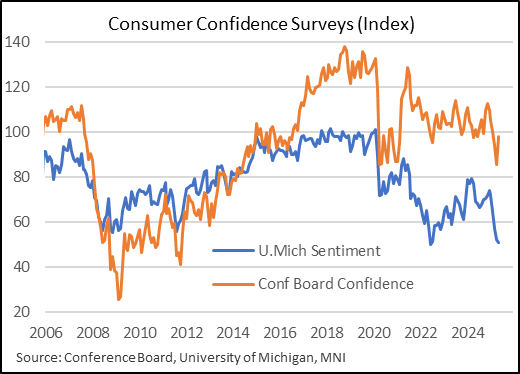US DATA: Consumer Confidence Surprisingly Bounces, Helped By China Trade Deal
- The Conference Board consumer survey saw much stronger than expected consumer confidence in May at 98.0 (cons 87.1) after a marginally downward revised 85.7 (initial 86.0) in April.
- The improvement was led by the expectations index (from 55.4 to 72.8) although the present situation also improved (from 131.1 to 135.9).
- Whilst an improvement in overall confidence, the 98.0 is still below the 104.5 averaged in 2024 for example, having recently peaked at 112.8 in Nov 2024 in the month of the presidential election.
- The press release on how US-China de-escalation on May 12 shaped results: "About half of the responses were collected after the May 12 announcement of a pause on some tariffs on imports from China.”
“The rebound [in confidence] was already visible before the May 12 US-China trade deal but gained momentum afterwards. The monthly improvement was largely driven by consumer expectations as all three components of the Expectations Index—business conditions, employment prospects, and future income—rose from their April lows." - Recall that the separate U.Mich preliminary survey for May was conducted Apr 22-May 13, “two days after the announcement of a pause on some tariffs on imports from China." It had added that "many survey measures showed some signs of improvement following the temporary reduction of China tariffs, but these initial upticks were too small to alter the overall picture”.
- As noted below, a further decline in the labor differential offered a more negative take on what was otherwise a reasonable report.

Want to read more?
Find more articles and bullets on these widgets:
Historical bullets
US TSYS: Extraordinary Measures And Cash Look Sufficient To Head Off X-Date
Treasury has about $164B in "extraordinary measures" available as of April 23 to avoid hitting the debt limit, per its regular report out Friday. That's out of a maximum total of $375B (they have used $211B).
- With Treasury cash looking healthy (around $600B), that's a fair amount of dry powder to get through the summer months to wait out the debt limit impasse. Tax receipts have looked strong with tariff revenues also starting to boost cash flows, further reducing the near-term urgency to adjust bond issuance.
- This has also helped push back analyst “x-date” expectations to later in the summer/September. We expect to hear from Treasury about its own x-date assumptions next week.

US TSYS: Treasury Market Trading Stayed Orderly In April: Fed Report
Liquidity across financial markets including the Treasury market deteriorated after President Trump's April 2 reciprocal tariffs announcement but market functioning was generally orderly, according to the Federal Reserve's semiannual report on financial stability, released Friday. (PDF link is here)
- Treasury market liquidity has been poor for years and yields were particularly volatile in early April, contributing to a deterioration in market liquidity, the Fed said.
- Nevertheless "trading remained orderly, and markets continued to function without serious disruption," according to the report, which looked at information available as of April 11.
FED: Ex-Gov Warsh: Fed Has Failed To Satisfy Price Stability Remit
From our Washington Policy Team - Some fairly sharp words today from ex-Fed Governor Warsh on the central bank (who for what it's worth is seen by betting markets as by far the frontrunner for the next Fed Chair):
- The best way for the Federal Reserve to safeguard its independence is for policymakers to avoid expanding the institution's role over time, including wading into policy areas that are outside its core mission, former Fed Governor Kevin Warsh, a leading contender to replace Jerome Powell as chair next year, said Friday.
- "I strongly believe in the operational independence of monetary policy as a wise political economy decision. And I believe that Fed independence is chiefly up to the Fed," Warsh said in a speech at a Group of Thirty event on the sidelines of the IMF meetings. "Institutional drift has coincided with the Fed’s failure to satisfy an essential part of its statutory remit, price stability. It has also contributed to an explosion of federal spending." His speech made no mention of Trump's tariffs or the appropriate monetary policy to deal with them.
- He said the ideas of data dependence and forward guidance widely adopted by Fed officials are not especially useful and might even be counterproductive.
"We should care little about two numbers to the right of the decimal point in the latest government release. Breathlessly awaiting trailing data from stale national accounts -- subject to significant, subsequent revision -- is evidence of false precision and analytic complacency," he said.
"Near-term forecasting is another distracting Fed preoccupation. Economists are not immune to the frailties of human nature. Once policymakers reveal their economic forecast, they can become prisoners of their own words. Fed leaders would be well-served to skip opportunities to share their latest musings."